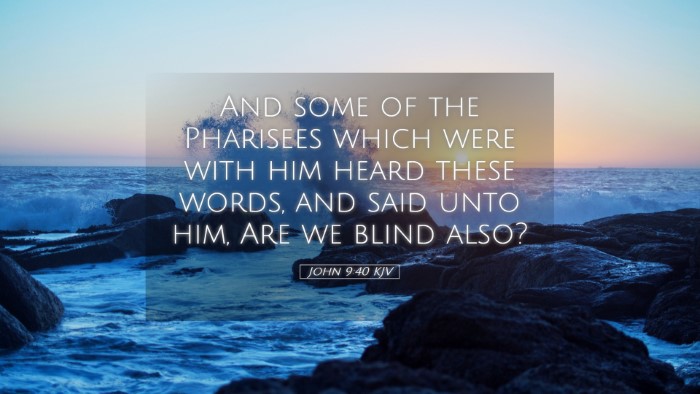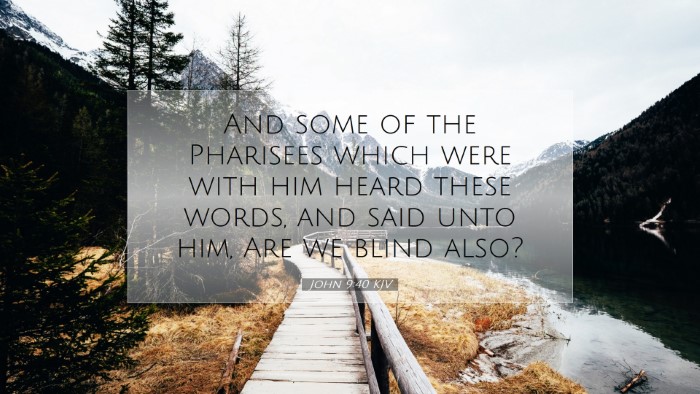Commentary on John 9:40
John 9:40 states: “Some of the Pharisees who were with him heard these things, and said to him, ‘Are we blind also?’”
Overview
This verse occurs within the profound narrative of Jesus healing a man born blind—a miracle that sparked significant theological debate among the Pharisees and those observing the events. The inquiry posed by the Pharisees signifies their defensive posture and unwillingness to acknowledge spiritual blindness that they possess despite their religious authority.
Insights from Matthew Henry
Matthew Henry views this verse within the context of the strong contrast between spiritual sight and blindness. He emphasizes that the Pharisees, despite being learned men, display an ironic blindness to the truth that Jesus presents. Henry comments on the rhetorical nature of their question, indicating their refusal to accept Jesus' revelation of God’s will.
- Spiritual Blindness: Henry illustrates that the Pharisees' inability to see the truth reflects their heart condition—a blindness brought on by pride and preconceived notions about the Messiah.
- Divine Revelation: He notes that true sight is a grace from God and cannot be claimed by intellectual pursuit alone. The Pharisees' question signifies both their disbelief and the spiritual condition they fail to recognize.
- Consequences of Blindness: Henry warns that pretending to possess sight while remaining blind leads to deeper ignorance and separation from God’s revelation.
Insights from Albert Barnes
Albert Barnes, in his exposition, elaborates on the Pharisees' challenge, parsing both their statement and the implications therein. He interprets their question as a challenge to Jesus and an assertion that they are not as flawed as He implies.
- Contextual Analysis: Barnes explains that the Pharisees have just witnessed a miracle and heard Jesus' discourse on spiritual blindness yet refuse to see their own failings.
- Conditional Statements: He points out the irony that their admission of possible blindness is a mocking question rather than a genuine query—demonstrating a hardened heart.
- Spiritual Insight: Barnes promotes the view that acknowledgment of one’s own blindness is the first step towards receiving true sight, aligning with the teachings of humility and penitence.
Insights from Adam Clarke
Adam Clarke provides a thorough analysis, highlighting the audacity and self-righteousness of the Pharisees at this moment. His commentary notes that their question embodies a rejection of Jesus’ ability to challenge their authority.
- Pharisaical Attitude: Clarke emphasizes that the Pharisees believed themselves to be the keepers of the Law and, by extension, the only possessors of divine truth. Their question reflects deep-seated insecurity in the face of Jesus’ powerful ministry.
- Irony of the Inquiry: He points out that by asking if they are blind, they inadvertently affirm their own condition. Clarke calls attention to their spiritual arrogance and unwillingness to reconsider their positions regarding the Messiah.
- Significance of Healing: Clarke highlights the significance of the miracle of the blind man—a manifestation of divine power that reveals the limitations of human understanding and the need for divine illumination.
Theological Implications
The interaction captured in John 9:40 serves as a microcosm for the broader themes present in the Gospel of John concerning revelation, faith, and the nature of spiritual blindness.
- Revelation's Challenge: This verse demonstrates how Jesus' teachings and miracles challenge existing religious paradigms. The response of the Pharisees serves as a warning against a rigid adherence to tradition that hinders spiritual growth.
- Faith vs. Intellectualism: The Pharisees represent a model where intellectualism and religious duty replace genuine faith and relationship with God. Their question illuminates the struggle between these two approaches in encountering Christ.
- Call to Humility: The commentary collectively emphasizes the call to humility in recognizing one's spiritual state. True understanding and sight come from relinquishing pride and embracing God’s truth revealed through Jesus Christ.
Practical Applications
This verse and its commentary provide several practical applications for contemporary believers:
- Self-Examination: Individuals are encouraged to examine their spiritual lives critically, asking whether they might be blind to the truths of Scripture because of preconceived notions or pride.
- Cultivation of Humility: The need for humility in approaching the Scriptures and church teachings is paramount. Recognizing the limitations of one’s understanding is vital for spiritual growth.
- Openness to Divine Revelation: Believers should remain open to how God speaks today, recognizing that He might challenge our understood truths, just as Jesus did with the Pharisees.


